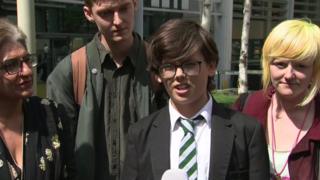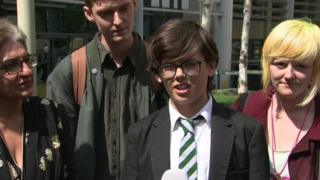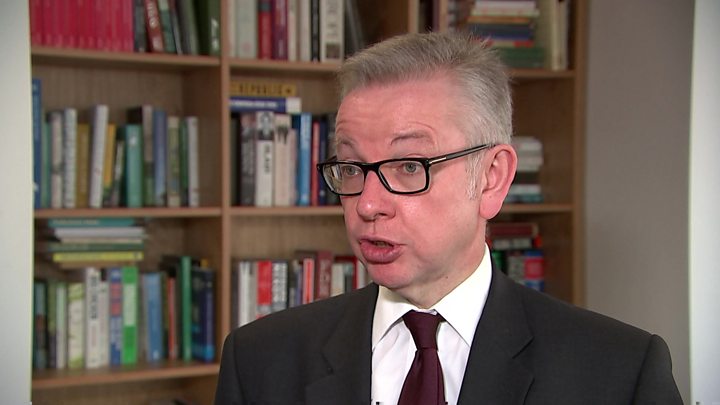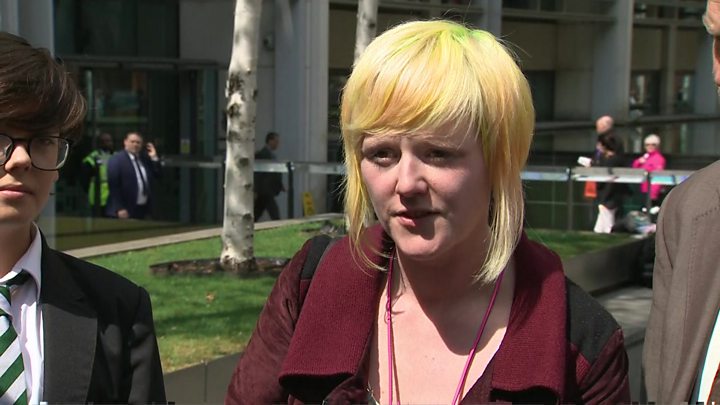Extinction Rebellion: Activists say meeting with Michael Gove ‘disappointing’


Extinction Rebellion says a meeting with Environment Secretary Michael Gove was “very disappointing” because he refused to declare a climate emergency.
The group – who carried out 10 days of climate change protests across London – met Mr Gove on Tuesday for talks.
But its youth representative, 14-year-old Felix Ottaway O’Mahony, said: “The rebellion has to continue because… our futures are not safe.”
Mr Gove said he “shared their high ideals” to tackle climate change.
Earlier, the group also met shadow chancellor John McDonnell, who promised to engage with the group’s demands, but activists said Labour needed to be “more ambitious” with its targets.
The Welsh and Scottish governments have both declared a climate emergency, along with dozens of towns and cities, including Manchester and London.
There is no single definition of what that means, but many local areas say they want to be carbon-neutral by 2030, and proponents say the situation amounts to an emergency because the United Nations has warned the world could have just 12 years left to limit a climate change catastrophe.
Extinction Rebellion has three main demands:
- For the government to “tell the truth” about the scale of the environmental crisis the world faces
- For the UK to enact legally binding policies to reduce carbon emissions to net zero by 2025
- For the government to form a Citizens’ Assembly to oversee the changes needed to achieve this
Following its large scale protests, a number of the group’s representatives went to the Department for Environment, Food and Rural Affairs to meet Mr Gove, Exchequer Secretary to the Treasury Robert Jenrick and the prime minister’s environmental advisor Lord Randall.
Mr Gove said the group’s first demand was “on the money” and agreed there needed to be a deeper level of public understanding over climate change.
He also said he was “open-minded” about the possibility of citizens’ assemblies.
But the environment secretary said, while he believed the state of carbon emissions was a “grave” one, there were questions around the timescale to reduce them and whether declaring a climate emergency was necessary.
“There is an open question to what the date should be and I am open to a higher level of ambition for this government than we have seen in the past,” he said.
“We have got to take action and what I would like this government to be judged by is, not what it proclaims, but what it achieves, and there is much more that we need to do.”

Media playback is unsupported on your device
Afterwards, Clare Farrell, co-founder of Extinction Rebellion, welcomed the “unexpected levels of interest” in the idea of citizens’ assemblies, but said ultimately the meeting “resulted in no concrete outcome”.
Climate change lawyer Farhana Yamin also praised a pledge by Mr Gove to discuss citizens’ assemblies with London Mayor Sadiq Khan, and a promise to raise the group’s demands with other members of the cabinet.
But Sam Knights, who works on Extinction Rebellion’s strategy team, said the refusal to declare a climate emergency was “not only a political failure, but a moral failure”.
He added: “It is important to stress how out of step the current political class is with ordinary people.
“We see this in the democratic deficit we have in this country and it is why we have had to be out on the street in force. It is not something any of us have done lightly but feel is a political necessity. “

Media playback is unsupported on your device
Following the meeting with Labour, Extinction Rebellion said Mr McDonnell “acknowledged the failure” of previous policies to tackle climate change.
The group also said he would request a meeting with the entire shadow cabinet for the demands to be presented.
However, it said the shadow chancellor did not commit to changing the proposed date in Labour’s climate change policy to reduce greenhouse gas emissions to net zero by 2050 – although he agreed to consider a new, more ambitious target of 2030.
Sign up for a weekly chat about climate change on Facebook Messenger


